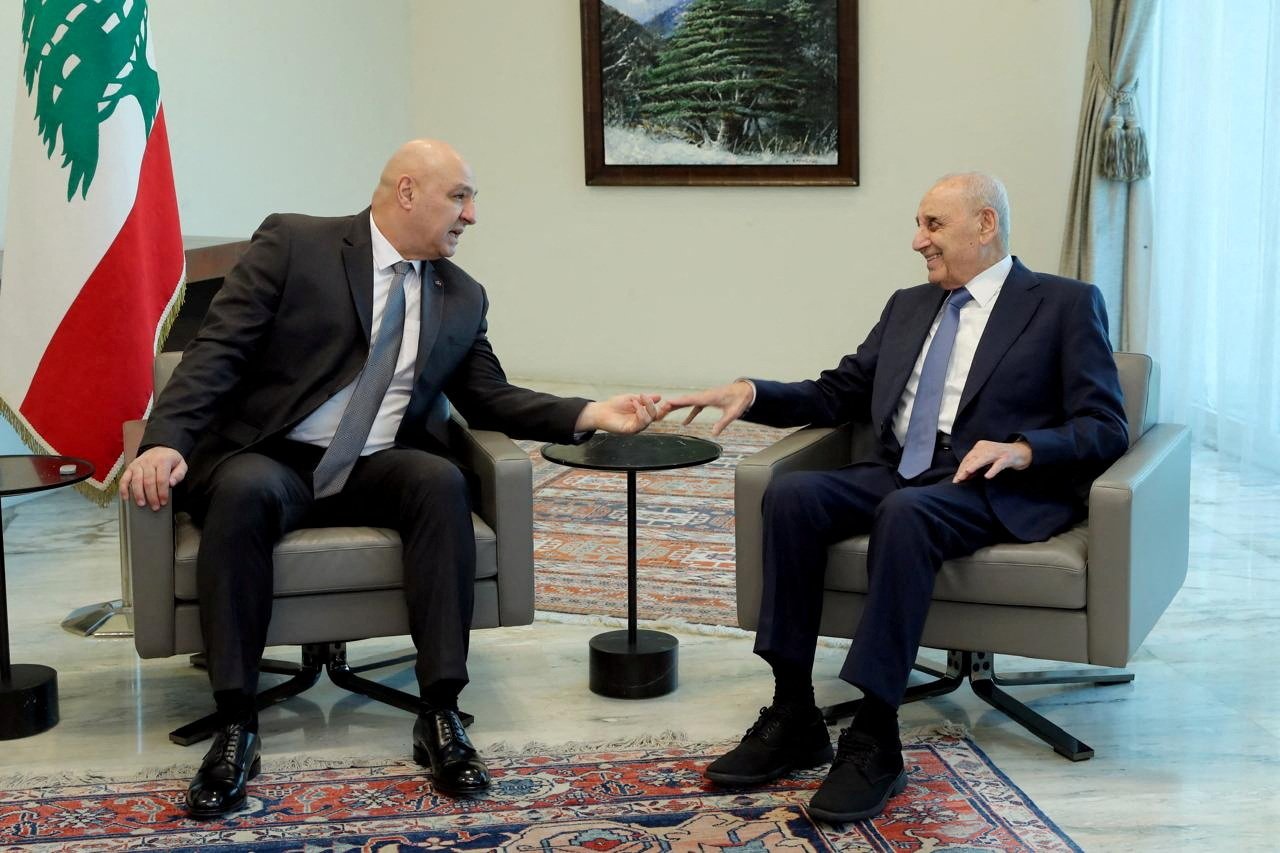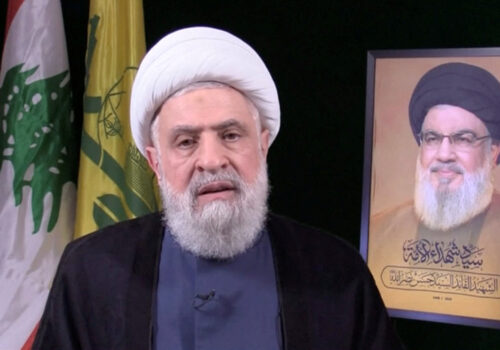If the words of Lebanese President Joseph Aoun’s inaugural address are to be taken at face value, his election represents the resumption of a long-suspended quest to transform the Cedar Republic from a fragment of the long-deceased Ottoman Empire to a modern nation-state. If Aoun proves able in the coming years to translate his word into action, Lebanon’s politics may someday rest on a solid foundation of citizenship instead of sectarianism.
Modern statehood has eluded Lebanon since its independence in 1943. As a result, Lebanon—which Michael Hudson termed “the precarious republic”—has seen a surge of disasters, leaving the country a battlefield for the wars of others and inflicting economic ruin on an enterprising, innovative populace.
Between 1958 and 1964, then President Fouad Chehab—Lebanon’s first army commander-in-chief, who was elevated to the presidency to end the low-grade civil war of 1958—tried his best to overcome the Ottoman legacy of sectarianism and feudalism and replace that legacy with a state. He instituted a series of administrative reforms designed to increase the effectiveness and reach of Lebanon’s central government and, by virtue of his personal modesty and incorruptibility, provided a model of selfless public service to his countrymen, a model rarely replicated by his successors. Indeed, Lebanon’s political class blocked him in the end. In 1970, the sectarian feudalists elected, by a single vote margin, one of their own to the presidency: Suleiman Frangieh. Lebanon’s trajectory has been straight downhill ever since.
SIGN UP FOR THIS WEEK IN THE MIDEAST NEWSLETTER
Over a half-century later, Franjieh’s grandson—another Suleiman—was the presidential candidate of choice of Iran’s Lebanese proxy, Hezbollah. Hezbollah, at the behest of Iran, has for decades supported a ravenously corrupt and ruinously incompetent Lebanese political class. In return, the politicians have recognized the group as “The Lebanese Resistance,” a designation elevating it above the status of armed militia and permitting it to bear arms. Twice, in 2006 and 2023, Hezbollah initiated hostilities with Israel, causing massive destruction falling mainly on its Shia Lebanese constituents. Finally, in late 2024, much of that kinetic destruction fell on Hezbollah itself.
Unlike several of his predecessors, Aoun neither mentioned nor paid obeisance to “The Lebanese Resistance” in his inaugural speech. Instead, he pledged “to carry out my duties as the supreme commander of the armed forces and as the chairman of the Higher Defense Council, working to ensure the state’s right to hold a monopoly on weapons, and to invest in the army to monitor the borders, maintain their security in the south, define the boundaries in the east, north and at sea, prevent smuggling, fight terrorism and preserve the unity of the Lebanese territory.” Indeed, much of the analysis following Aoun’s accession to the presidency has, quite understandably, mined his speech for references to Hezbollah, but Aoun did not mention the group by name.
Aoun’s first task will be to ensure that the Lebanese Armed Forces (LAF) implements Lebanon’s role in the ceasefire with Israel by removing and replacing Hezbollah as the armed Lebanese presence south of the Litani River. He will, to be sure, require the cooperation of Iran’s proxy, which retains considerable military capabilities notwithstanding the pounding it has absorbed from Israel. To succeed, Aoun must perform a diplomatic high-wire act: He must, in effect, mediate between Hezbollah and Israel.
The mediation tool most readily at his disposal is the 1949 Israel-Lebanon General Armistice Agreement. The ongoing validity of the armistice, unilaterally (and unjustifiably) renounced by Israel in 1967, is cited by the 1989 Taif Agreement and is, therefore, a tenet of post-civil war Lebanon’s constitutionalism.
Aoun could signal to Israel his interest in implementing and consolidating the current ceasefire by offering Israel the opportunity to update and fully implement the armistice, a critical first step toward eventual peace and diplomatic normalization. Israel could, in turn, assure Lebanon of its own commitment to making the ceasefire work by revoking its 1967 renunciation, completing its withdrawal behind the Blue Line (demarcated by the United Nations in 2000), and declaring its readiness to resolve diplomatically all territorial disputes with Lebanon. It could even suspend its overflights of Lebanese airspace, perhaps as part of a third-party arrangement providing ceasefire-related aerial reconnaissance services. Given that the armistice is anchored in Lebanese constitutionalism, Hezbollah—which acknowledges the need to focus on reconstruction, for the sake of its constituents—might be hard-pressed to object and obstruct. Ideally, Hezbollah’s constituents will urge the organization’s leadership cadre to put Lebanon first by becoming part of a Lebanese political party instead of a proxy for Iran.
Aoun knows what must be done to stabilize the Lebanon-Israel frontier. But the long game he wishes to contest and win centers on Lebanese statehood. This is how he put it in his inaugural speech: “if we want to build a nation, we must all be under the roof of law and justice, where there will be no more mafias or security islands, no more leaks or money laundering, no more drug trafficking, no more interference in the judicial system, in police stations, no more protections or clientelism, no more immunity for criminals and the corrupt. Justice is the bulwark, it is the only guarantee that every citizen has. This is my commitment!” This will be a tall order because the collaboration between Hezbollah—meaning Iran—and Lebanon’s abysmal political class (which still dominates parliament) has left the country awash in all the depravities cited by Aoun.
The Lebanese presidency in 2025 is not endowed with the same powers it enjoyed before the 1989 Taif Accord, and in any event, such powers were insufficient for Chehab to build a state. Aoun will not be able administratively to compel governmental decency, honesty, and competence, even if he proves able to broker a respectable cabinet of ministers and even if he retains the full, enthusiastic support of the LAF. If he wishes to succeed, he must build a mass political movement from the ground up, one dedicated not to him personally but to the idea that it is time, at long last, for Lebanon to graduate from Ottomanism, and that it is time for citizenship-based statehood to emerge. As Aoun put it in his acceptance speech, “No sect should be favored over another, and no citizen should have privilege over another. This is the time for respecting the Constitution, building the state and applying the laws. This is the oath of Lebanon!”
Aoun must, in short, use his office to build the political infrastructure needed to win elections, to ultimately replace the parliamentarians who have used that which has passed for the “government of Lebanon” as a feeding trough. Only with the support of enough Lebanese people willing to abandon political sectarianism and localism can he build a foundation for a nation-state willing and able to meet the needs of all Lebanese citizens, especially the poorest and most vulnerable.
As Aoun embarks on a journey to complete the work of Chehab, he will need both external support and internal protection. Lebanon’s reconstruction needs are enormous, as are the operational challenges faced by the LAF. And there are, to be sure, those in Lebanon who correctly see Aoun as a threat to their ability to steal the fruits of Lebanese diligence, ingenuity, and enterprise.
It is only the gratuitous and often unspeakable suffering and impoverishment of most Lebanese and their consequent desperation that makes Aoun’s quest something other than mission impossible. Some three-quarters of all Lebanese people are now experiencing poverty, and they know that business as usual by a dysfunctional political class is no longer tolerable. The people of Lebanon now have a president willing to say the following: “My commitment is your commitment, honorable members of parliament, and that of every Lebanese person who wants to build a strong state, a productive economy, stable security, a united nation and a promising future.”
The duty of all Lebanese people and all friends of Lebanon is to give Aoun the support he needs to build the “strong” state that the people of Lebanon require to thrive and to live in peace.
Frederic C. Hof is a senior fellow at Bard College’s Center for Civic Engagement. Hof served as a military attaché during Lebanon’s civil war and mediated both maritime and land disputes between Israel and Lebanon from 2009 to 2012 as a State Department official. He is the author of Reaching for the Heights: The Inside Story of a Secret Attempt to Reach a Syrian-Israeli Peace (2022).
Further reading
Tue, Nov 5, 2024
Naim Qassem is finally the bride
MENASource By David Daoud
Hezbollah will not moderate or shift its primary loyalties to Lebanon under its new soft-spoken secretary-general.
Image: Lebanese Parliament Speaker Nabih Berri meets with Lebanon’s President Joseph Aoun at the presidential palace in Baabda, Lebanon January 14, 2025. Lebanese Presidency Press Office/Handout via REUTERS THIS IMAGE HAS BEEN SUPPLIED BY A THIRD PARTY

